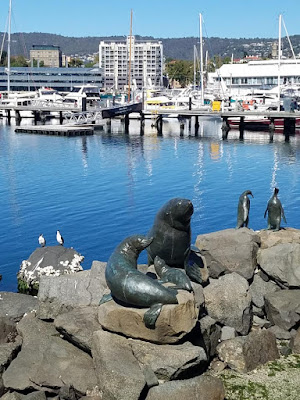First we stop for an overlook of the town of Burnie. It was originally inhabited in 1827 and today is a major shipping port.
Next was a stop at Guide Falls...not much water flowing as the summer season was dry here. It is now late summer/early fall here downunder. We enjoy hiking to falls even if there is only a trickle of water flowing.
Some of the trees are starting to turn as seen in the reflection on the water.
In the distance we see St. Valentine's Peak as we near the Cradle Mountain National Park.
Gwen took this photo of Terry and I as we headed out for a hike on the trail around the lake.
And head toward Glacier Rock..it's on the water's edge just above us in the previous photo. It is also called Suicide Rock as it was used by aborigines for that purpose
This trail goes for 50 miles between the mountains. Terry is probably wishing we were here long enough to hike the Overland Track.
We made it to the top of Glacier Rock for a nice view of Dove Lake.
Still inside the national park, we then drove over to the Waldheim Chalet and learned a little bit of the history of the park. From the 1820s to the park's declaration as a reserve in 1922, these former Aboriginal homelands were visited by explorers, prospectors, trappers, and hunters,
It was the vision of Austrian-born Gustav Weindorfer and his Tasmanian-born wife, Kate, which ultimately led to this place being declared a national park. Weindorfer was determined to build a chalet and a road to enable people from everywhere to come and enjoy this beautiful park.
We headed for a walk through the forest, appropriately named after Gustav.
The forests are known as the "bush". This trail took us through an ancient rainforest.
These trees are referred to as "celery" trees because the foliage is only at the top, like a celery stalk.
There is lots of moss...
...and ferns
As we leave the Cradle Mountain National Park area we stop for a photo of another waterfall
As we drive back to the port, we stop at Braddon's Lookout for a view of the rich farmland and a last glimpse of the mountains.
Sailing on the ocean in the evening often gives us the opportunity to enjoy a wonderful sunset.
The next day we are in Hobart, Tasmania--this is Tasmania's capital city. For 20K years, Aboriginal peoples inhabited Tasmania before Dutch explorer Abel Tasman visited the island in 1642. We spent several days in the Hobart/Port Arthur area in 2010 so today we took it easy and did something really fun...Trikemania!
Here we are on the "trike". Our driver/guide David kept us laughing throughout the entire wild ride through the streets of Hobart.
We stopped for the view on top of Mount Nelson.
The Old Signal Station, established in 1811, was once the major link between Hobart and the penal colony in Port Arthur further south.
David of Trikemania Adventures gave us a wonderful tour of the Hobart area and a most exciting ride throughout the streets. It was great fun!
There are tents and more tents filled with vendors selling crafts, clothing, jewelry, and food items. A shopper's paradise for sure.
Next to the market area is St. David's Park.
The park is a formal English styled wall park and dates back to the beginning of the European settlement in 1804.
A very colorful tree and my good lookin' hubby.
Hobart began life as a penal colony in 1804 but free settlers, whalers and sealers also arrived looking for a new life. This area was once the cemetery for those early settlers. Now many of the headstones are displayed on the walls in St. David's Park.
Very interesting to walk through and note the names and dates on the gravestones.
Back on the ship we were entertained before sailaway by the Tasmania Police Pipe Band and the local Irish Dance School students.
This drummer was fun to watch. He is the youngest member of the band at age 17. He looked very serious but at times, his playful personality would shine through.
Again, when on a cruise ship and at port for only a day, so much of the area is missed. We were happy we had several days in the Hobart and Port Arthur area in 2010. To read what more we saw, click here.
We now head back to the continent and into the wine country of Australia and to new ports for us as we circle the continent.
To continue reading scroll down and click on "Newer Post".














































No comments:
Post a Comment